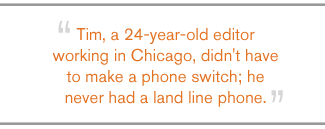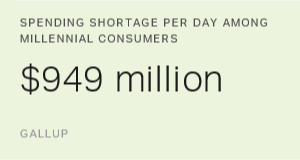When Alexander Graham Bell patented his telephone more than 100 years ago, it's fair to assume that he didn't envision a wireless world. Nor could he have imagined the impact of the greatest innovation of the late 20 th century -- the Internet -- on how people would come to consider and use his invention. Regardless, a wave of broadband or IP-based telephony is evident, and mobile phone devices are now nearly as ubiquitous as home phones. New research by The Gallup Panel illustrates how consumers are embracing the future of phones.
 |
Burgeoning broadband
To get a baseline understanding of Americans' phone services, the survey first asked panelists to identify any services -- land line phone, cell phone, or broadband phone -- they use. Not surprisingly, 92% report having residential phone service, and 88% report having a cellular or mobile phone. (Respondents with lower incomes and those who live in rural areas tend to lag behind the curve in reported cell phone ownership.) But what stands out most is the growing use of broadband or IP-based phones.
Nearly 2 in 10 Americans report that they use broadband phone services. Considering that Internet-based phone usage became a mainstream commercial product just five years ago, 20% market penetration is pretty remarkable. Younger Americans are leading the charge, with Generation X and Generation Y members more than twice as likely as traditionalists to have a broadband phone.
With apologies to Gil Scott-Heron, the broadband revolution is one that may in fact be televised, since cable TV carriers are at the forefront of IP-based phones. By bundling their digital phone products in packages that include cable television and Internet service, cable companies are outstripping the subscription rates for phone-only offerings from companies like Vonage and products like Skype, which allow users to make voice calls via their computer.
Income is a major variable when it comes to IP-based phone service subscription. Specifically, 25% of those with annual household income that exceeds $75,000 use IP-based phone services, compared to 18% of those with income between $35,000 and $75,000, and just 11% of those who earn less than $35,000 per year. Those with more formal education are also more likely to be IP-based phone users.
Going "cell only"
Increasingly, Americans are thinking of their phone as something mobile, without a fixed location. The study asked Panel members if they had any family or friends who use only their cell phone and do not have any residential land lines. Nearly half of respondents said that either "most" or "some" (7% and 41%, respectively) of their acquaintances are cell-only phone users. Twenty-six percent report that "hardly any" of their family and friends use only cell phones. And 25% say that none of their friends or family rely solely on cell phones.
Further, 8% of Americans report that they have canceled their residential phone service. Among that group, more than half (59%) did so to switch to a mobile or cellular phone. And, one-quarter of those who switched say that they moved to a broadband phone service.
Tim Schulte, a 24-year-old editor working in Chicago, didn't have to make a phone switch; he never had a land line phone. "I think the last time I had a land line, it was in my dorm room in college. Now, I'm only home a few hours each day. For me, it is just a practical choice because the cost for a land line compared to the time I used it just didn't add up. For somebody my age, cell phone is the financially smart way to go," says Schulte.
The data confirm Schulte's sentiment. A majority of Generation Y panelists who report switching (72%) say they went to a cell-only arrangement. Income is another key variable in reporting a switch to cell phone only, as is reporting that one's friends or family members are cell-phone-only users.
The content key
The Gallup Panel survey results indicate that a significant amount of phone switching may still be coming. Specifically, 14% of respondents say that it is very or somewhat likely that they will switch service to cellular or broadband within the next 12 months. Again, younger panelists are more likely than their older counterparts to indicate an impending switch.
With broadband phone penetration being driven by cable television providers and mobile phones evolving into multi-media, multi-function devices to capture wireless Internet service, the phone reformation intersects at one word -- content. Those companies with the means to generate and deliver content are positioned to rule the new telephone age. That is, if the word "phone" is even still germane.
Schulte, who by his own admission was never really that devoted to music and not by any means a confirmed "technophile," has carried an Apple iPhone since July. "It's amazing to be able to check sports scores and e-mail, listen to music, or surf the Web," he says. "I never thought of the value that comes from having that media in the palm of my hand. But now it would be hard to get away from."
Alexander Graham Bell's vision of delivering audio electronically was just the tip of a content iceberg. For the next generation of phone users, the key is the glacier-sized amount of audio, video, text, and images made available by the Internet.
